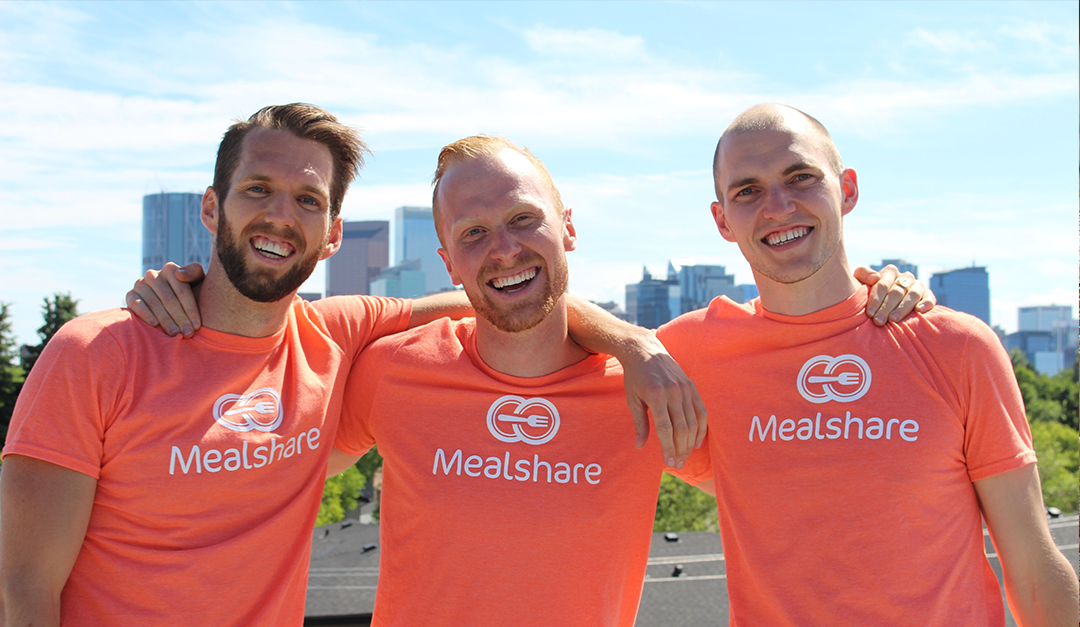By Sasha Milam. Photo courtesy of Breanne Sich. Originally published in the Summer 2021 issue of Business Class Magazine.
While on the surface computers have seemingly nothing to do with food insecurity, Andrew Hall, BCom ’11 and co-founder of non-profit Mealshare, points out one thing his industry can take from the history of computers: the lesson of human ingenuity.
“In the course of a generation or two, computers went from taking up an entire floor to fitting in your pocket,” says Hall. “And the one in your pocket outperforms the apartment-sized one by a long shot. If we can make that leap in such a short time, there’s no reason we can’t completely end youth hunger.”
Hall founded Mealshare in 2013 with cousin Jeremy Bryant (and was joined shortly after by Derek Juno, also BCom ’11 and now EVP at Mealshare). As a growing non-profit, Mealshare has experimented, evolved and ultimately carved a mission for itself: to be Canada’s restaurant charity.
The model is simple: customers in any of their 1,180 partner restaurants across Canada can choose an item on the menu that is marked as a Mealshare item. The team then provides a healthy meal to a local young person through its network of partner charities.
This focus, combined with a mission to partner with big restaurant brands (“that’s where the impact is”) has meant making some tough choices along the way.
“In order to stay true to our brand over seven years, we’ve had to say no to some things so we can do a really good job at the one thing we do,” says Hall. “That means losing some potential supporters who want to, say, buy an oil change and share a meal. The idea here is to create a clear brand message for Mealshare: buy a meal, give a meal.”
This ability to put innovation to work towards a dedicated vision for positive change has proven useful
to the Mealshare team. But the year 2020 showed them the downfalls as well as the enormous upsides of their approach.
“When people suddenly weren’t allowed to go to restaurants, that was not good for us,” says Hall. “That’s where 90 per cent of our revenue came from.”
“Building a brand is a balancing act between diversification—so you can survive something like a pandemic—and being specific enough about your mission to move the hearts of people. There’s no right answer about how diversified you should be.”
As COVID-19 kept restaurant-goers at home, the Mealshare team grappled with the frustration of knowing
there were more people than ever who were food insecure, at the same moment that the non-profit’s plunge in revenue meant they couldn’t provide as many meals as usual. (It’s fairly well understood that about one in five Canadian children experienced food insecurity leading up to the pandemic. While studies and updates are still in the works, some organizations predicted that one in three Canadian youth would be food insecure in spring 2021.)
“Last year completely obliterated the business,” says Hall. “Our revenue plunged by 90 per cent. We had to lay everyone off, ourselves included. We spent the summer exploring different pivots that would keep us going until things levelled out.”
From May to September 2020, they considered everything from getting acquired by a non-profit to getting acquired by a for-profit, from partnering with grocery stores and delivery services to moving in-house and being run by a major restaurant chain. (They recently announced a partnership with Skip the Dishes, so some of these ideas paid off.) From their years in the business, however, they knew any new conversation with a big chain would take longer to come to fruition than Mealshare could afford to wait.
But remember that dogged focus they had? The single-mindedness that initially looked like a downside, because it meant their business was at risk when restaurants weren’t able to operate as usual? There was an upside, too.
“We had a partnership in the works pre-2020 that was delayed by the pandemic. After exploring all these pivots that ultimately wouldn’t save us, we finally went to the restaurant chain we had been planning to roll out with and said: ‘We may not be around next year to partner with, so if you want to do this, let’s do it soon.’”
The chain was A&W, and in the fall, A&W responded that yes, it wanted to partner. Announced in February 2021, the deal was enough to get Mealshare back to normal operations. But it would never have been possible to pull the launch off if they had not been planning and building towards it in a general way for years—and in specific ways for all of 2020.
“A&W has 1,000 restaurants in 475 communities across the country,” says Hall. “And part of Mealshare’s promise is that you make a local impact with the meals you donate. So to keep that promise we had to deliver partnerships with 400 new charities, and it takes a lot of time to build relationships with all these little charities.”
Fortunately, they had been diligently working on these relationships all year, and by the time of launch, every A&W location had a local charity partner.
“In the long run, our mission is the same: end youth hunger in Canada,” says Hall. “When we look at the 50-year graph, 2020-2021 will hopefully be just a blip.”


